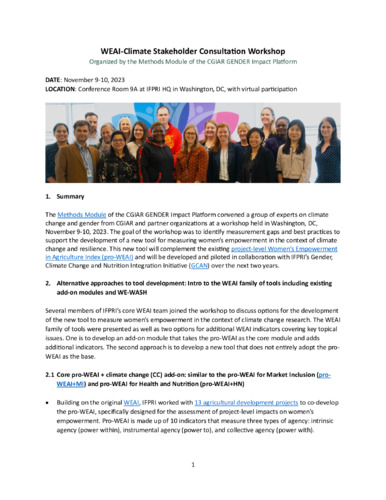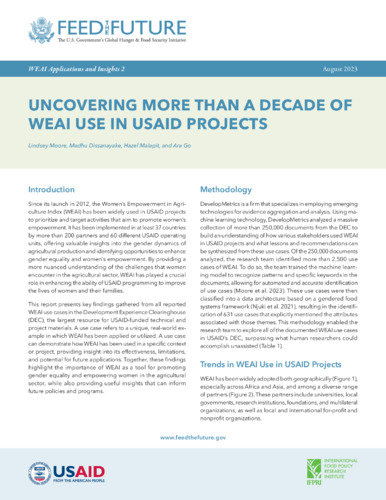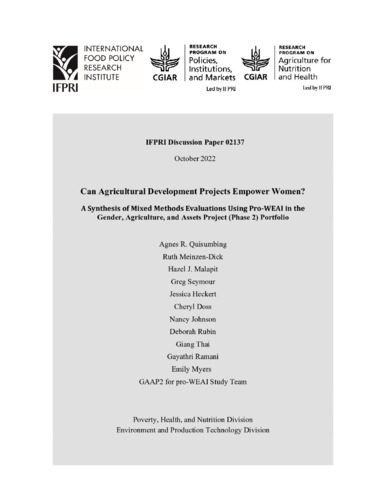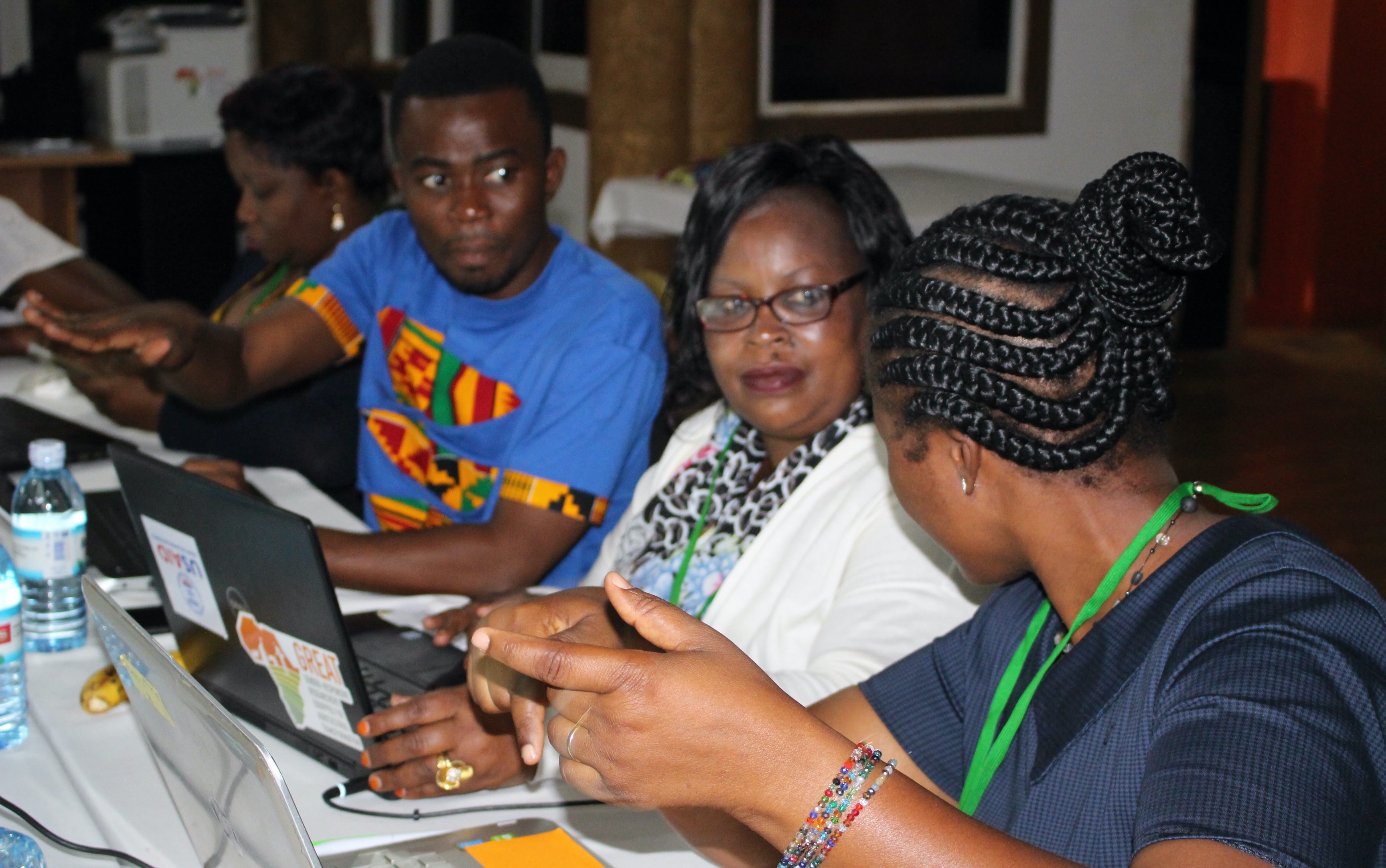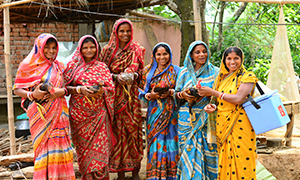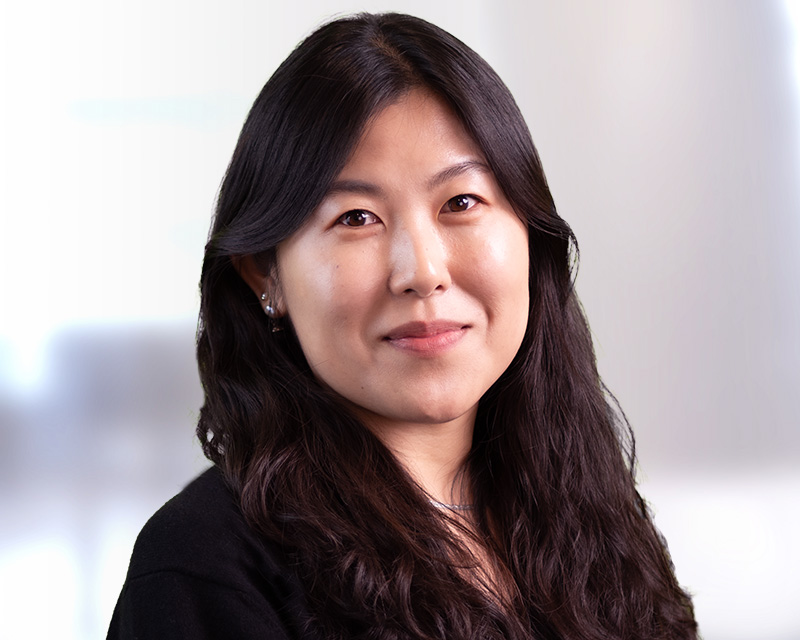Can agricultural development projects empower women? A synthesis of mixed methods evaluations using pro-WEAI in the gender, agriculture, and assets project (phase 2) portfolio
Agricultural development projects increasingly include women’s empowerment and gender equality among their objectives, but efforts to evaluate their impact have been stymied by the lack of comparable measures. Moreover, the context-specificity of empowerment implies that a quantitative measure alone will be inadequate to capture the nuances of the empowerment process. The Gender, Agriculture, and Assets Project, Phase 2 (GAAP2), a portfolio of 13 agricultural development projects in nine countries in South Asia and Africa, developed the project-level Women’s Empowerment in Agriculture Index (pro-WEAI) and qualitative protocols for impact evaluations. Pro-WEAI covers three major types of agencies: instrumental, intrinsic, and collective. This paper synthesizes the results of 11 mixed-methods evaluations to assess these projects’ empowerment impacts. The projects implemented the pro-WEAI and its associated qualitative protocols in their impact evaluations. Our synthesis finds mixed, and mostly null impacts on aggregate indicators of women’s empowerment, with positive impacts more likely in the South Asian, rather than African, cases. There were more significant impacts on instrumental agency indicators and collective agency indicators, reflecting the group-based approaches used. We found few significant impacts on intrinsic agency indicators, except for those projects that intentionally addressed gender norms. Quantitative analysis does not show an association between the types of strategies that projects implemented and their impacts, except for capacity building strategies. This finding reveals the limitations of quantitative analysis, given the small number of projects involved. The qualitative studies provide more nuance and insight: some base level of empowerment and forms of agency may be necessary for women to participate in project activities, to benefit or further increase their empowerment. Our results highlight the need for projects to focus specifically on empowerment, rather than assume that projects aiming to reach and benefit women automatically empower them. Our study also shows the value of both a common metric to compare empowerment impacts across projects and contexts and qualitative work to understand and contextualize these impacts.
Authors
Quisumbing, Agnes R.; Meinzen-Dick, Ruth S.; Malapit, Hazel J.; Seymour, Greg; Heckert, Jessica; Doss, Cheryl R.; Johnson, Nancy L.; Rubin, Deborah; Thai, Giang; Ramani, Gayathri V.; Myers, Emily; GAAP2 for pro-WEAI Study Team; Dione, Malick; Martinez, Elena M.; Pereira, Audrey; Van Biljon, Chloe; Vaz, Ana; Elias, Marlène; Annet Mulema; Go, Ara; Federica Argento; Ahmed, Akhter; Anika Hannan; Younus, Masuma; de Brauw, Alan; Amita Dey; Kramer, Berber; Murphy, Mike; Benjamin Crookston, Megan Gash; Bobbi Gray; Benali, Marwan; Schreinemachers, Pepijn; Caroline Sobgui; Sarah Janzen; Joshi, Neena; Nicholas Magnan; Pradhan, Rajendra; Sudhindra Sharma; Theis, Sophie; Marc Bellemare; Bart Casier; Susan James; Brooke Krause; Mathias Lardinois; Aine McCarthy; Sabine Gabrysch; Sinharoy, Sheela; Waid, Jillian; Amanda Wendt; Awonon, Josué; Ganaba, Rasmané; Gelli, Aulo; Martinez, Elena; Pedehombga, Abdoulaye; Sanou, Armande; Sita Zougouri; Alonso, Silvia; Galiè, Alessandra; Tasokwa Kakota; Leroy, Jef L.; Palloni, Giordano; Bryan, Elizabeth; Mekonnen, Dawit Kelemework; Mamun Miah; Kumar, Neha; Saiqa Siraj; Alemu, Mihret; Boonabaana; Brenda; Ana Paula de la Ocampo; Susan Kaaria; Hillesland, Marya; Erdgin Mane; Slavchevska, Vanya; Avijit Choudhury; Madhu Khetan; Raghunathan, Kalyani
Citation
Quisumbing, Agnes R.; Meinzen-Dick, Ruth Suseela; Malapit, Hazel J.; Seymour, Greg; Heckert, Jessica; Doss, Cheryl; Johnson, Nancy; Rubin, Deborah; Thai, Giang; Ramani, Gayathri V.; Meyers, Emily; and GAAP2 for pro-WEAI Study Team. 2022. Can agricultural development projects empower women? A synthesis of mixed methods evaluations using pro-WEAI in the gender, agriculture, and assets project (phase 2) portfolio. IFPRI Discussion Paper 2137. Washington, DC: International Food Policy Research Institute (IFPRI). https://doi.org/10.2499/p15738coll2.136405
Keywords
Southern Asia; Western Africa; Sub-saharan Africa; Africa; Eastern Africa; Women’s Empowerment; Gender Equality; Impact Evaluation; Agriculture; Agricultural Development; Impact Assessment
Access/Licence
Open Access
Project
Policies, Institutions, and Markets
